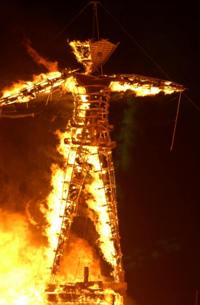 What would drive almost fifty thousand people into the desert for a week? Why would those thousands voluntarily go back to basics in a temporary township without most of the spoils of modern living?
What would drive almost fifty thousand people into the desert for a week? Why would those thousands voluntarily go back to basics in a temporary township without most of the spoils of modern living?
Burning Man has been described as an annual experiment in temporary community, dedicated to radical self-expression and radical self-reliance. It’s about people finding a way to ‘find themselves’ and to get in touch with their own brand of spirituality.
A lot has been written about Burning Man since it began and it has spawned a number of similar festivals.
So what are people finding in Burning Man that they’re not finding in the established Christian church? Rather than dismissing a festival which seeks to create community and an opportunity for participants to express themselves, maybe we should be learning from Burning Man.
So what are the main principles of Burning Man?
Radical Inclusion
Anyone may be a part of Burning Man. We welcome and respect the stranger. No prerequisites exist for participation in our community.Gifting
Burning Man is devoted to acts of gift giving. The value of a gift is unconditional. Gifting does not contemplate a return or an exchange for something of equal value.Decommodification
In order to preserve the spirit of gifting, our community seeks to create social environments that are unmediated by commercial sponsorships, transactions, or advertising. We stand ready to protect our culture from such exploitation. We resist the substitution of consumption for participatory experience.Radical Self-reliance
Burning Man encourages the individual to discover, exercise and rely on his or her inner resources.Radical Self-expression
Radical self-expression arises from the unique gifts of the individual. No one other than the individual or a collaborating group can determine its content. It is offered as a gift to others. In this spirit, the giver should respect the rights and liberties of the recipient.Communal Effort
Our community values creative cooperation and collaboration. We strive to produce, promote and protect social networks, public spaces, works of art, and methods of communication that support such interaction.Civic Responsibility
We value civil society. Community members who organize events should assume responsibility for public welfare and endeavor to communicate civic responsibilities to participants. They must also assume responsibility for conducting events in accordance with local, state and federal laws.Leaving No Trace
Our community respects the environment. We are committed to leaving no physical trace of our activities wherever we gather. We clean up after ourselves and endeavor, whenever possible, to leave such places in a better state than when we found them.Participation
Our community is committed to a radically participatory ethic. We believe that transformative change, whether in the individual or in society, can occur only through the medium of deeply personal participation. We achieve being through doing. Everyone is invited to work. Everyone is invited to play. We make the world real through actions that open the heart.Immediacy
Immediate experience is, in many ways, the most important touchstone of value in our culture. We seek to overcome barriers that stand between us and a recognition of our inner selves, the reality of those around us, participation in society, and contact with a natural world exceeding human powers. No idea can substitute for this experience. – Burning Man
It sounds like an incredibly empowering event. While there are a number of elements of Burning Man that I couldn’t embrace there are some very attractive aspects to the festival.
So what can we learn from Burning Man?
My regular Wednesday morning guest on 98.5 Sonshine FM is Ross Clifford who is the Principal of Morling College in New South Wales and Vice President elect of the Baptist World Alliance. Each week we chat about a range of issues relating to spirituality and belief.
A couple of weeks ago I spoke to Ross about the Burning Man festival and what we can learn from it. You can listen to our discussion by clicking the play button on the audio player at the bottom of this post.
[audio:http://mpegmedia.sonshinefm.ws/feeds/SPI171109_0929.mp3]Do you think some of your friends would enjoy reading Burning Man? Please use the buttons below to share the post. Thanks.

I’ve been a fan of Burning Man for about 5yrs b/c of its artistic and creative expression. While the festival’s designers rely on its inclusive ethos, I wouldn’t call a ‘participatory ethic’ necessarily radical. Some of the people who attend are definitely radical but that is my opinion based on their artistic output. They tend to keep their beliefs very much to themselves (as I understand it). One day, I shall go to Burning Man and tell you what it was like. I think it would be quite an … um, englightening experience. A little terrifying perhaps, too!! Nice article 🙂
Great to hear from you CAW.
I reckon it’s a fascinating concept. While it’s not ‘quite’ the same thing I’ve found my rides across Australia have carried similar outcomes in the sense that in a much smaller way they throw a group of people together to live in community to share a similar passion.
I’ve found that it’s the experiences that help us break out of normal routines that help us discover more about ourselves and life.